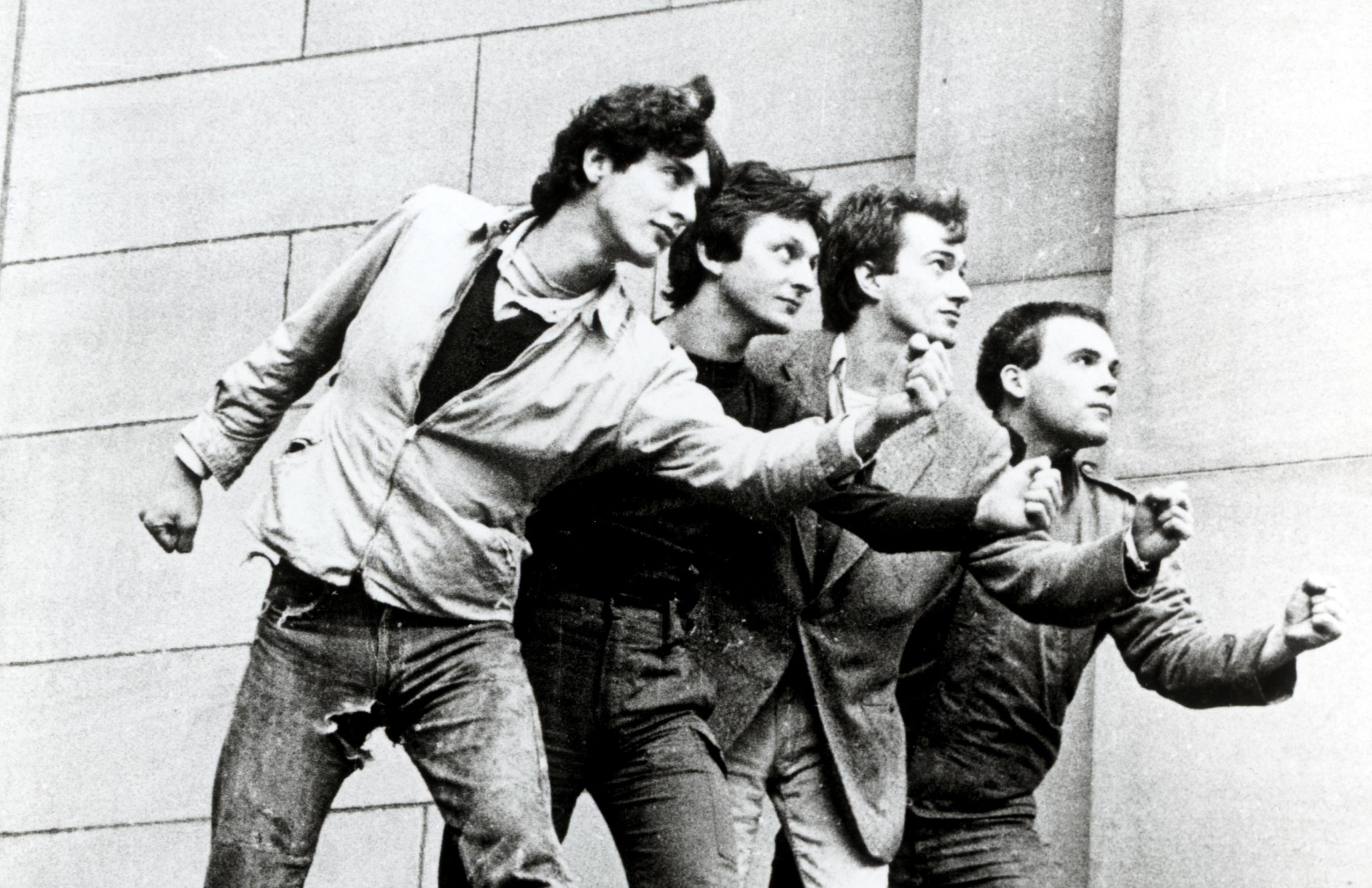To the long and lustily devoted, Gang of Four and its prime motivator Andy Gill had (and still have) a startling sound and a smartly smug lyrical concern like no other. Unrelentingly jagged in its vision with a mix of stammering guitars, scissoring rhythms, and wry vocals attacking texts geared toward Britain’s sociopolitical consciousness in the post-Pistols era, the late guitarist Gill (who continued Go4 until his death) and fellow co-founders, vocalist Jon King and drummers Hugo Burnham (along with bassists Dave Allen and Sara Lee) were unparalleled in all that they thought and acted out.
The more notable acts that they came to influence in their time, such as Red Hot Chili Peppers, Fugazi, Talking Heads, and Rage Against the Machine, luckily steered clear of direct copycat appropriation, and instead found inspiration in activist ardor, molten-lava liquidity, and funky dividends. Perhaps unsurprisingly, then, it’s Rage’s Tom Morello who’s made the most interesting attempt to pay heed to the savage screeds and stuttering pulse of Gang of Four.
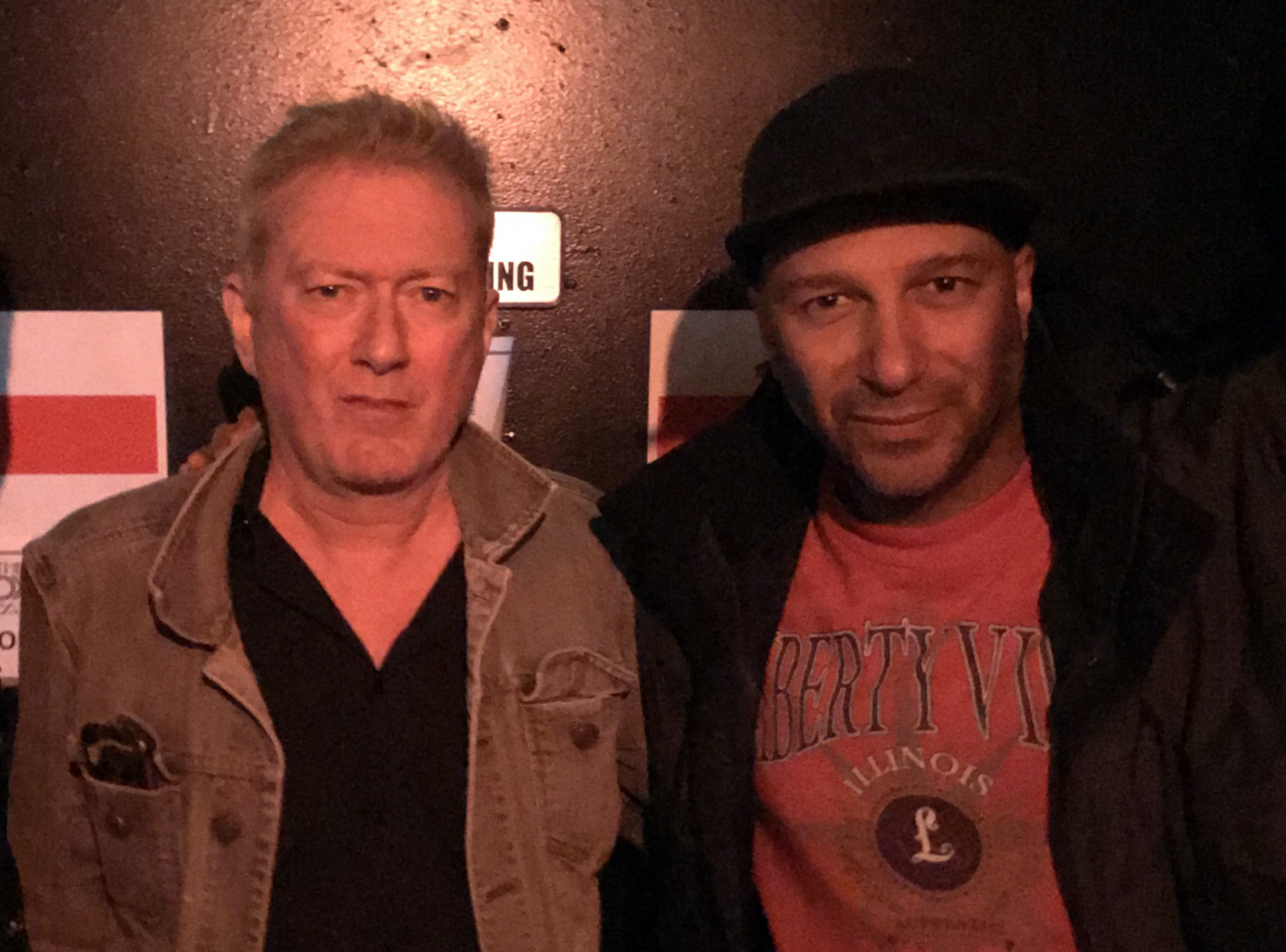
Andy Gill and Tom Morello in LA, 2019 / photo by Catherine Mayer
“Andy Gill was one of a handful of artists in history who changed the way guitars are played,” Morello said in a statement. “His band Gang of Four were just incendiary and completely groundbreaking with Andy’s confrontational, unnerving, and sublime playing at the forefront. His jagged, plague-disco, raptor-attack, industrial-funk, deconstructed guitar, anti-hero sonics, and fierce poetic radical intellect were hugely influential to me.”
In order to heed that dictum, Morello (after Gill had started the project before his untimely death) gathered up friends—such as System of a Down’s Serj Tankian, who covered “Natural’s Not in It” with Morello, artist Damien Hirst, and a handful of bands made whole by Gang of Four—for the double album release, The Problem of Leisure: A Celebration of Andy Gill and Gang of Four.
With that, here are just a few of Andy Gill and Gang of Four’s celebrators. From each of my correspondents, I wanted to know how they first fell in love with Go4, how their politics affected them, and how they came to cover the songs that most inspired them on The Problem of Leisure.
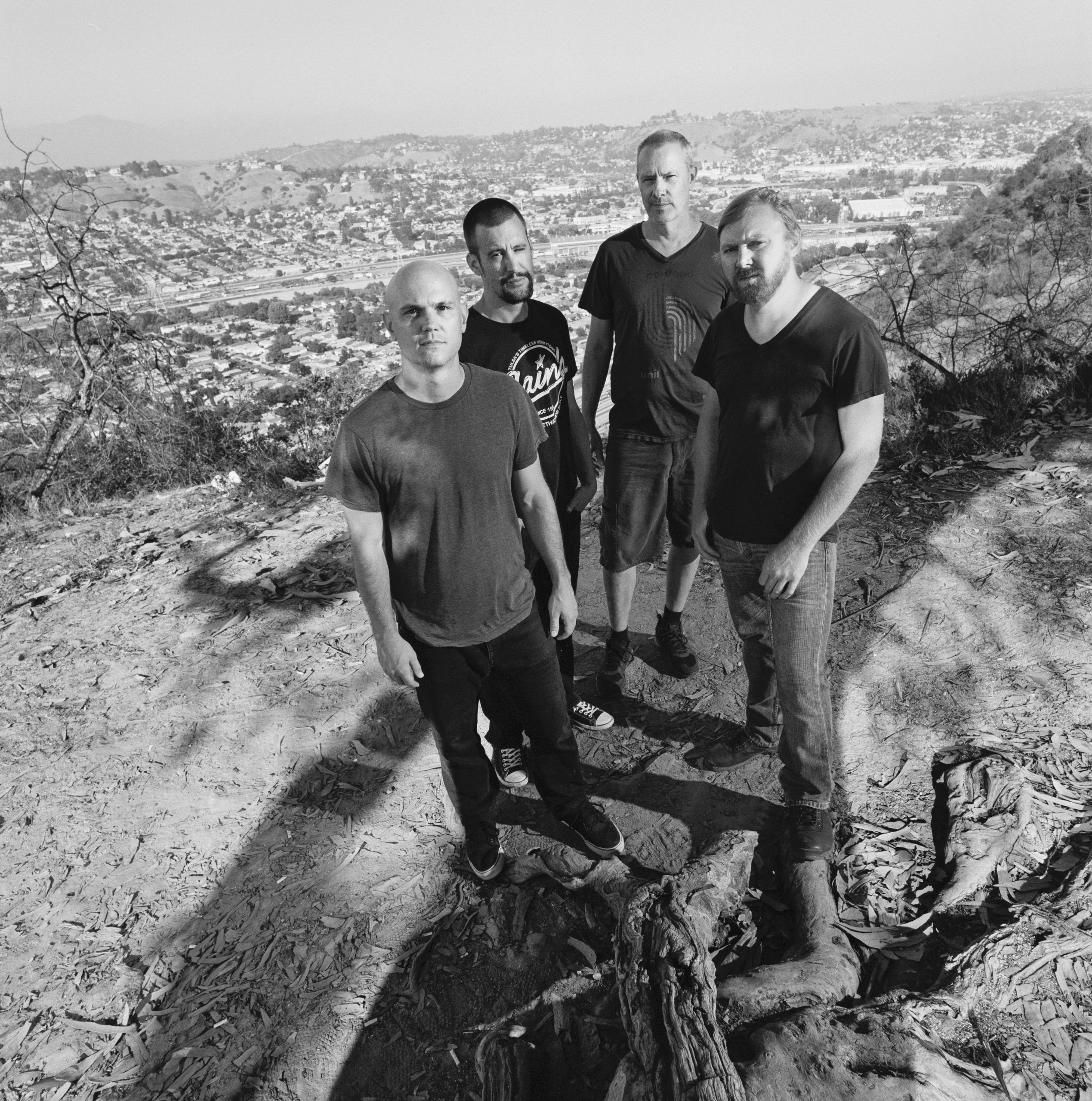
Helmet / photo by Jacob Blickenstaff
Page Hamilton of Helmet
You were pretty much a contemporary of Gang of Four’s in terms of timing and scene. Whether coming up as a listener or as a burgeoning artist, what did you know about them? And when did you make the transition from casual knowing to obsession?
I was actually buried in NYC jazz-geek land at Manhattan School of music and wasn’t into the polished rock my friends were listening to. After I finished school I joined Band of Susans and Glenn Branca’s ensemble in 1988. BoS covered “I Found That Essence Rare”; it was the highlight of my night whenever we played it. After that, I bought everything Gang of Four did, and wore the albums out.
What was your impression of Gang of Four’s lyrics and music?
Life-changing. So intense, honest, and important to me. They helped revive my interest in rock-guitar music. None of it was gratuitous, poser, rockstar bullshit—just a powerful and important band. There’s no one like them, though my peers and friends in NYC all borrowed from them. They changed the way I play and write and sing.
Considering that so much of Gang of Four’s political and social outlook was geared toward the U.K. and Europe, how do you believe their most aggressively political lyrics transcended borders?
I always felt their commentary was universal; it still rings true today. “The worst thing in 1954 was the bikini,” “dressed for the H-bomb,” “whatever you do, stay calm!” Jon King’s voice is somehow beautiful but scary as fuck. He sings his ass off, but it’s not a bunch of histrionics and fake American Idol soul cliches. He demands that we listen. The sense of urgency is not just hardcore testosterone raging…I don’t know, man, this was as perfect as music gets.
Tell me about choosing the song that you grabbed to cover—what do you believe you did with it to make it both unique to their spirit and yours?
When a band makes incredible albums—i.e. every song is great—it’s not easy to pick a favorite, but “In the Ditch” has always kicked my ass. It has an improvised feel, like it’s loose but arranged. All the parts work so well together, and it’s important to maintain that vibe. You feel chaos in this really powerful groove. There are guitar riffs, but Andy’s vocabulary is deep, so trying to work out every rhythmic figure could sound stiff and ruin the feel.
The parts flow so freely, but the groove is never abandoned—it’s like Gang of Four free funk! Hugo and Dave are such an underrated rhythm section. Their time is impeccable and they’re so locked in, but it still feels free and improvised, a locomotive pushed to the limit that never crashes. Gang of Four and Helmet have dudes named Dave on bass, and our Dave Case is incredibly dedicated and paid attention to every detail of Dave Allen’s parts. He actually counted every note in the breakdown! Kyle, Dan, and Dave understand how important this band is to me, and they were very dedicated to knowing the song so we could make it our own.
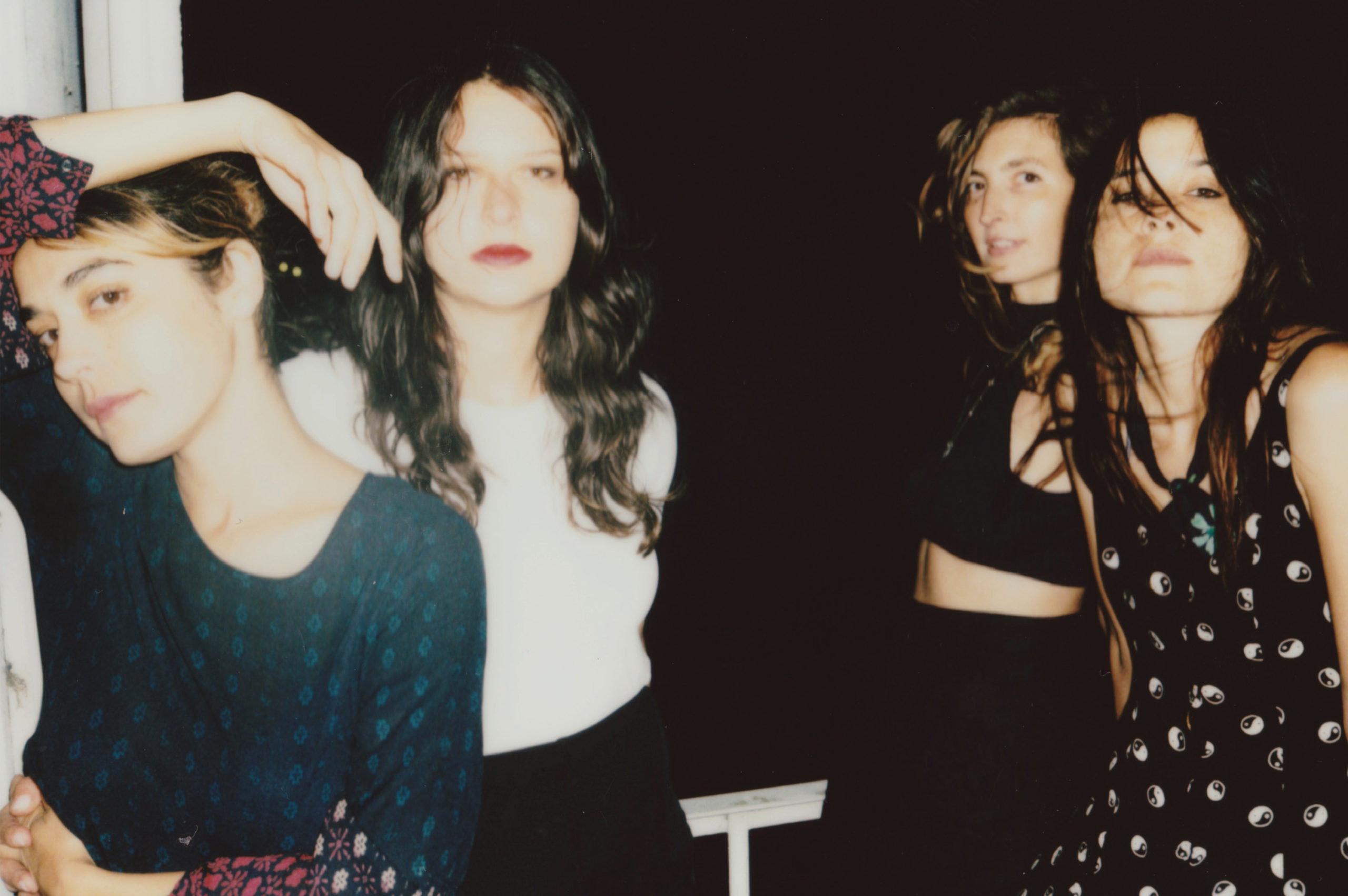
Warpaint / photo by Mia Kirby
Jenny Lee of Warpaint
Whether coming up as a young listener, a fan, or as a burgeoning musician, what did you know about Gang of Four? And when did you make the transition from casual knowing to obsession?
“Damaged Goods” was the first tune I had ever heard, and instantly fell in love. I hadn’t explored their catalogue until later, when I was able to appreciate and really hear what was going on in the music. Also hearing it as a musician, which came a little later in life for me, was another little treat.
Considering that so much of Gang of Four’s political and social outlook was geared toward the U.K. and Europe, how do you believe their most aggressively political lyrics transcended borders?
I feel like more often than not, really prolific music usually comes from abroad. Obviously not in every case. I didn’t really get into Gang of Four until my late teens…but I do remember their music appearing in lots of skate videos and such, inspiring young kids not only with their music, but with their lyrical content as well. In short, they were very well received around my parts.
Tell me about choosing the song that you grabbed to cover—what do you believe you did with it to make it both unique to their spirit and yours?
I originally wanted to do “Damaged Goods,” but it wasn’t available…I wanted to pick a song I could hear making it my own. I didn’t want to do a verbatim cover. “Paralyzed” felt like an open canvas.
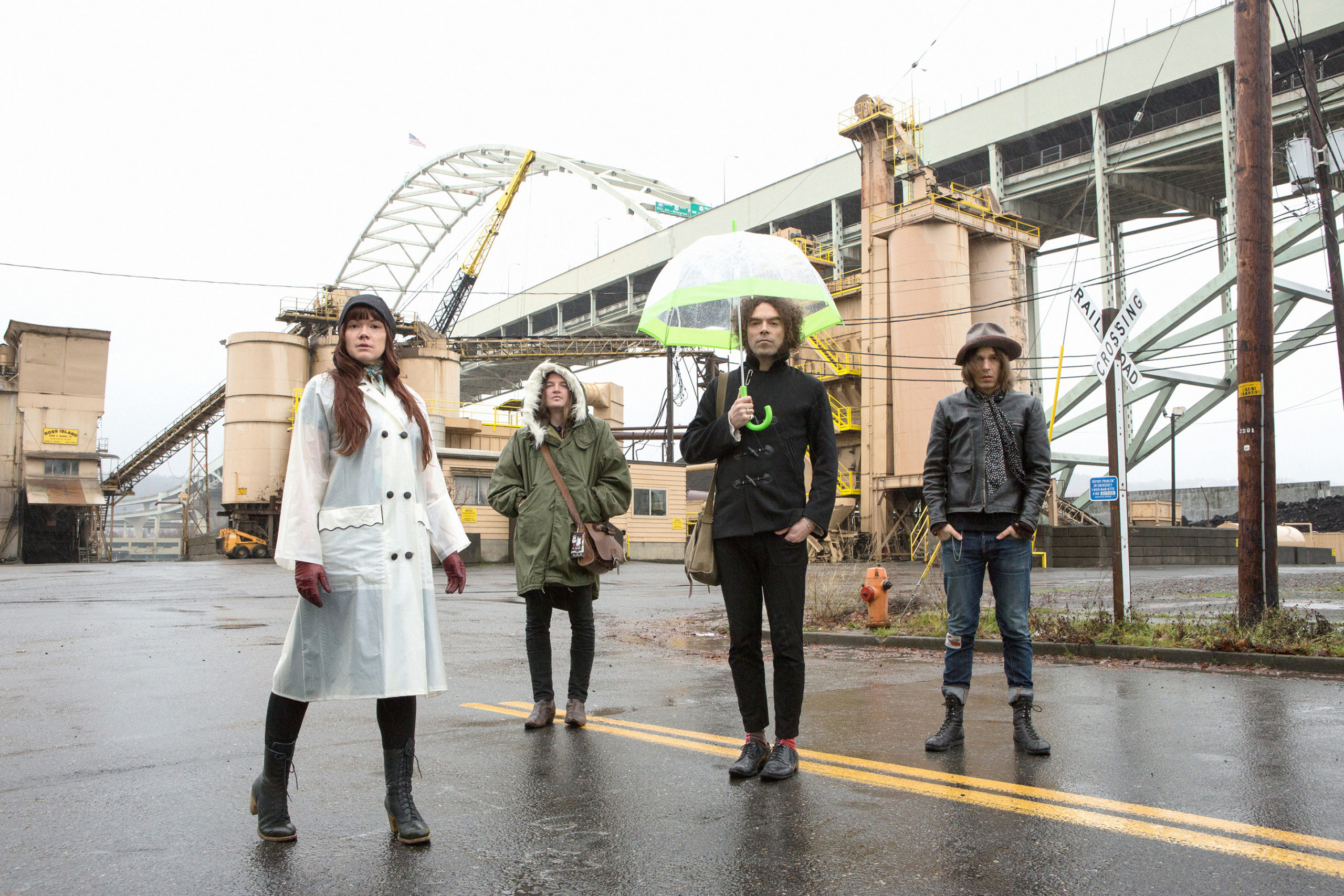
The Dandy Warhols / photo by Scott Green
Peter Holmström of The Dandy Warhols
Whether coming up as a young listener, a fan, or as a burgeoning musician, what did you know about Gang of Four? And when did you make the transition from casual knowing to obsession?
I barely knew anything about them as a kid. I’d heard the name of course. But Portland, Oregon didn’t have a radio station that played them, and I didn’t have MTV. I later obsessed on Dave Allen’s bass playing in Shriekback and then discovered Gang of Four.
What was your impression of Gang of Four’s lyrics and music?
I loved the music. The combination of groove and aggression was undeniable. I never paid much attention to any lyrics back then.
Considering that so much of Gang of Four’s political and social outlook was geared toward the U.K. and Europe, how do you believe their most aggressively political lyrics transcended borders?
I’m sure they did to the people that were looking for that. From my experience as a young white heterosexual American male, most political stuff was ignored.
How and why did you come to this project?
Andy had actually asked us to be a part of the project about six to eight months before he passed. We had played a number of festivals with them and had contributed a remix to a record before, so he knew we were fans.
Tell me about choosing the song that you grabbed to cover—what do you believe you did with it to make it both unique to their spirit and yours?
I chose “What We All Want” because it was the remix I did for them. Actually, the first remix I had ever done. There are so many great Gang of Four songs, but we had history with this one. I started it with doing my best to replicate the groove with a drum machine, and then did my best Dave Allen attempt on the bass. Courtney [Taylor-Taylor of The Dandy Warhols] then added guitar and vocals, which gave it the Dandy vibe. It’s a great track, so it was super easy.
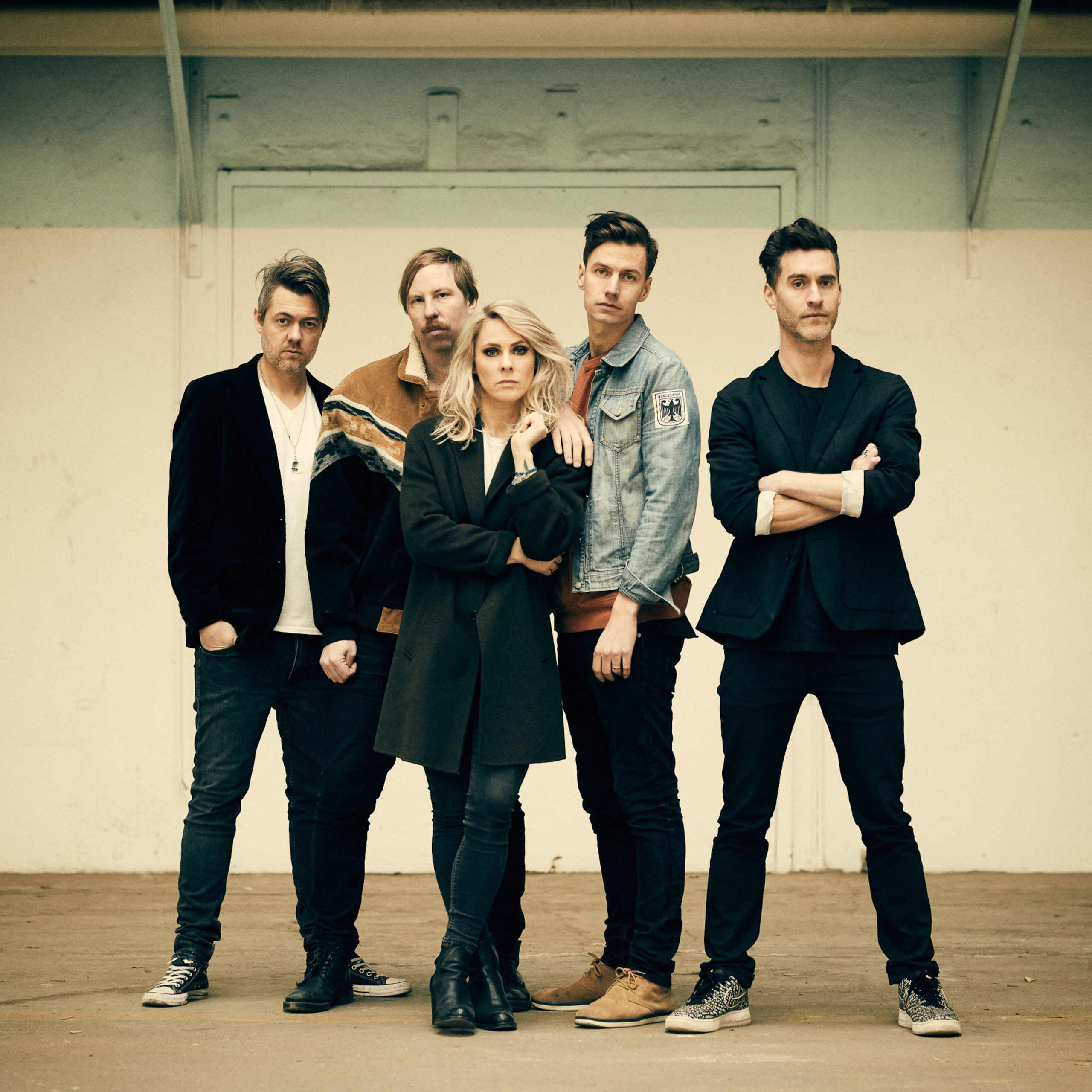
The Sounds / photo by Scott Green
Jesper Anderberg of The Sounds
Whether coming up as a young listener, a fan, or as a burgeoning musician, what did you know about Gang of Four? And when did you make the transition from casual knowing to obsession?
In the beginning of our career, Gang of Four was always that band other bands talked about. We knew of them, but never really dug deeper than that. Then, the more we played in the U.K., in all those punk clubs, you automatically got to know them better and better and their legacy became pretty obvious. It also felt like our music had a lot of common ground musically, and in vibe and intensity.
Considering that so much of Gang of Four’s political and social outlook was geared toward the U.K. and Europe, how do you believe their most aggressively political lyrics transcended borders?
Since I was born in Sweden in the beginning of the ’80s, I wasn’t exposed in the same way to many of these conflicts and the overall atmosphere in the world. But listening and discovering music during my youth, I got to learn and feel this period of time from their lyrics. Bands like Gang of Four, Joy Division, and New Model Army all painted lyrical pictures of declining social conditions, military conflicts, and governmental betrayal in a way that led me to become more enlightened politically, historically, and especially fostering me to care and understand that the world is full of injustice, and realizing that music is a way to create a movement in order to change the world. So, yes, I absolutely think Gang of Fours lyrics transcended borders—their lyrics were relevant then, and are still today.
How and why did you come to the Problem of Leisure project?
It seems our band had been on Andy’s radar, and we had been approached through our team to see what our thoughts on contributing to the album would be. We rarely participate in projects that are not our own work, but we were moved and inspired to try something. Fortunately everyone is quite happy with how it all turned out, and we hope we did justice to this iconic song and Go4.
Tell me about choosing the song that you grabbed to cover—what do you believe you did with it to make it both unique to their spirit and yours?
It’s hard to cover a song, any song, but you need to feel that you can make the song just. Gang of Fours version of ”I Love a Man in a Uniform” is brilliant, both lyrically and musically. Lyrically, it really hit me off as very relevant today, and musically it’s quite different from their earlier stuff, so I felt there was some room to experiment and make a version that takes the best from the original, but also can turn it into a The Sounds song that we potentially could perform live. It has that attitude I love about our own music, and I could really feel that this song is a song that we could have written if we were born 20 years earlier.
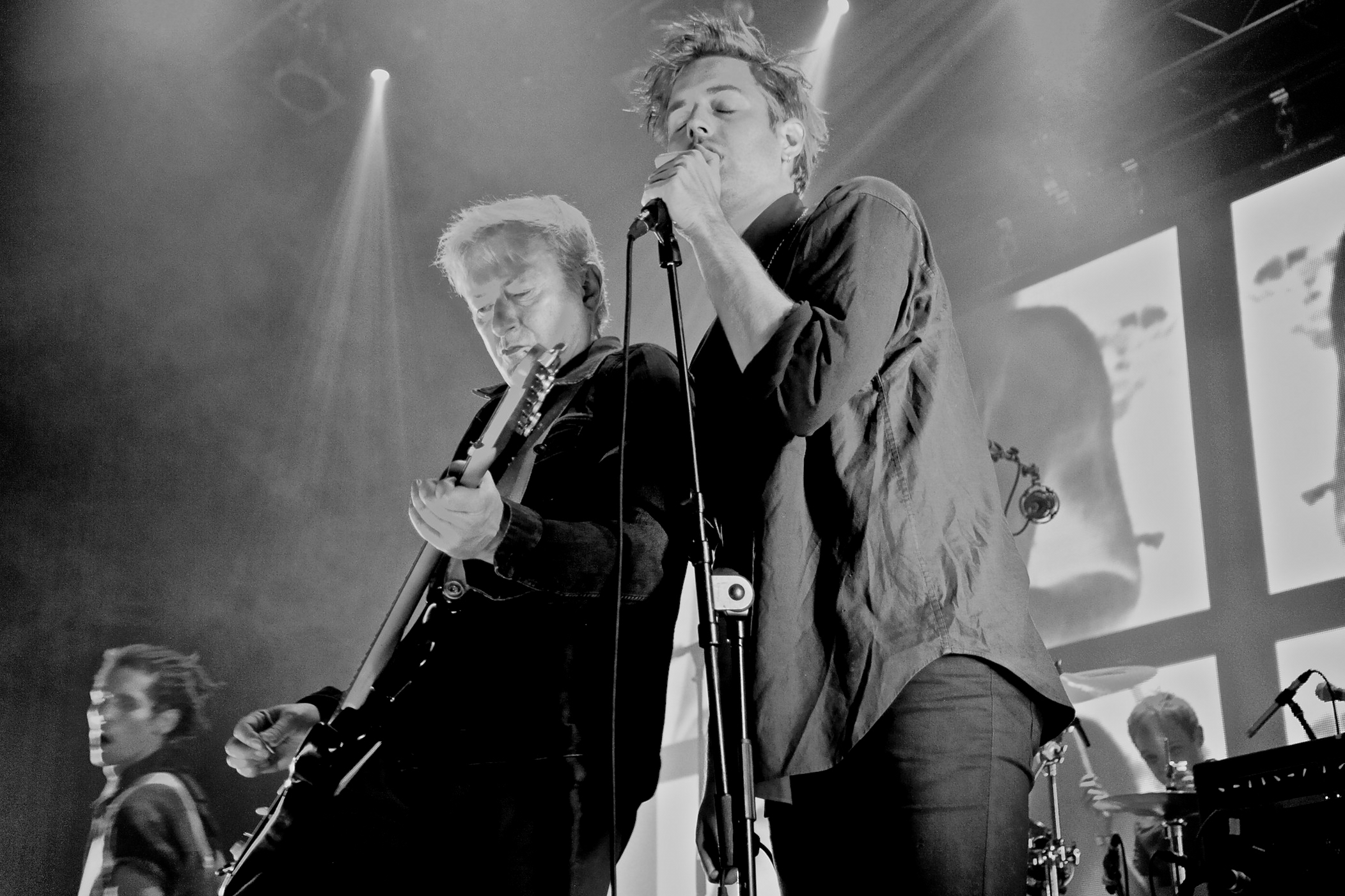
Gang of Four / photo by DJ Markham
John Sterry, vocalist for Gang of Four’s last iteration
Whether coming up as a young listener, a fan, or as a burgeoning musician, what did you know about Gang of Four? And when did you make the transition from casual knowing to obsession?
I heard about Gang of Four from a Rough Trade Records compilation way back when and loved the song; “Damaged Goods,” it was. I assumed at the time it was a modern track, as it was on an album full of new songs. But after a bit of digging it turned out that a load of the bands on there were directly influenced by Gang of Four—all that angular indie stuff from the mid 2000s… Obviously then I went back and listened to all the band’s material and fell in love with the attitude—lots of people have tried to copy that sparseness and funk mixed with punk, but nobody really sounds quite like them.
What was your impression of Gang of Four’s lyrics and music?
I liked the fact that lyrically it goes from talking about big themes (politics, capitalism, war etc.) and boils it down to personal relationships—how those big things affect our everyday lives and interactions.
Considering that so much of Gang of Four’s political and social outlook was geared toward the U.K. and Europe, how do you believe their most aggressively political lyrics transcended borders?
All that stuff transcends borders anyway, I guess—the themes the band is known for are experienced by every citizen in pretty much every country in the world; I was always amazed whenever we went to new countries how they would respond to different lines or ideas in the songs. They really connect with people. It doesn’t matter whether they were talking about Margaret Thatcher, the U.S. army, or Northern Ireland, the general feeling is something we can all relate to. It’s never coming at you with solutions or ways to think, it’s just putting a mirror up to these crazy, messed-up things and making you think. That’s why it’s stood the test of time and space. Aside from everything else, though, they’re just great tunes people can dance to.
How and why did you come to this tribute project?
I was obviously very close to Andy when the idea for the project first came about, so I saw it grow from an Entertainment! tribute album to something bigger—a general tribute to the impact Gang of Four has had. He’d send me new versions as they were sent to him, so I felt involved in some of the decision-making process and was as excited as he was about it. When he died I really wanted to do a song as my way of honoring Andy and the band, so I set about recording one.
Tell me about choosing the song that you grabbed to cover—what do you believe you did with it to make it both unique to their spirit and yours?
When I knew I was going to be recording something for the album, the choice of song was immediately obvious. I wanted to do “5.45” because we’d played that song all through the last couple of tours, every night, and I felt like I had a close relationship with the song and knew it inside out, so I knew I could do it justice. Also, it has a great kind of spoken word feel to the vocal, which is something that echoes with the stuff I’m doing as JJ Sterry. But the overriding thing I kept thinking when recording it was just how current it felt, lyrically. That image of watching horrific scenes unfolding on television whilst sitting in the comfort of your living room really resonates with how people are feeling right now. 24-hour news, the pandemic, escalating tensions throughout the world…it’s all played out as a kind of entertainment for us at home. I didn’t want to recreate it note-for-note, or even use the same sonic palette, but I knew I did want to recreate the feeling the song initially had when I heard it, and I’m really happy with the result. FL
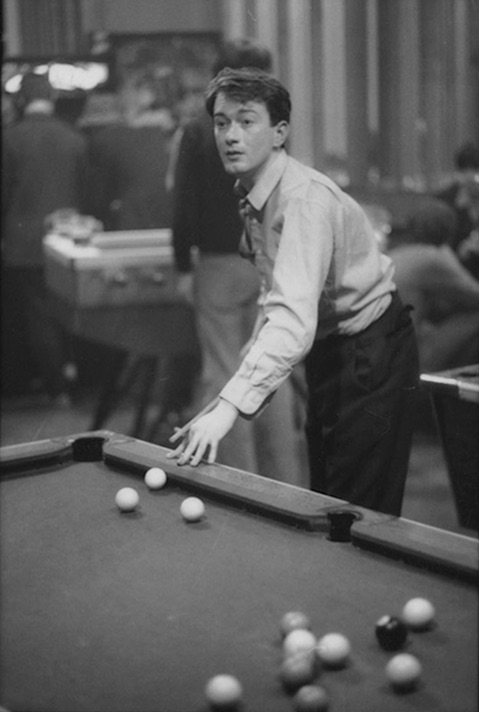
Andy Gill / photo by Anton Corbijn

